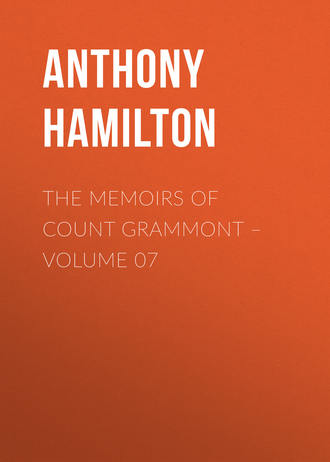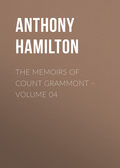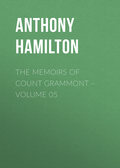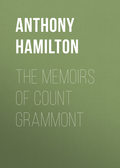
Anthony Hamilton
The Memoirs of Count Grammont – Volume 07
"I presented her with one of the prettiest horses in England. You know what peculiar grace and elegance distinguish her on horseback. The king, who, of all the diversions of the chase, likes none but hawking, because it is the most convenient for the ladies, went out the other day to take this amusement, attended by all the beauties of his court. His majesty having galloped after a falcon, and the whole bright squadron after him, the rustling of Miss Stewart's petticoats frightened her horse, which was at full speed, endeavouring to come up with mine, that had been his companion; so that I was the only witness of a disorder in her clothes, which displayed a thousand new beauties to my view. I had the good fortune to make such gallant and flattering exclamations upon that charming disorder as to prevent her being concerned or out of countenance upon it: on the contrary, this subject of my admiration has been frequently since the subject of our conversation, and did not seem to displease her.
"Old Lord Carlingford, and that mad fellow, Crofts (for I must now make you my general confession), those insipid buffoons, were frequently telling her some diverting stories, which passed pretty well with the help of a few old threadbare jests, or some apish tricks in the recital, which made her laugh heartily. As for myself, who know no stories, and do not possess the talent of improving them by telling, if I did know any, I was often greatly embarrassed when she desired me to tell her one: 'I do not know one, indeed,' said I, one day, when she was teazing me on the subject. 'Invent one, then,' said she. 'That would be still more difficult,' replied I; 'but if you will give me leave, madam, I will relate to you a very extraordinary dream, which has, however, less appearance of truth in it than dreams generally have.' This excited her curiosity, which would brook no denial. I therefore began to tell her that the most beautiful creature in the world, whom I loved to distraction, paid me a visit in my sleep. I then drew her own portrait, with a rapturous description of all her beauties; adding, that this goddess, who came to visit me with the most favourable intentions, did not counteract them by any unreasonable cruelty. This was not sufficient to satisfy Miss Stewart's curiosity: I was obliged to relate every particular circumstance of the kindness I experienced from this delicate phantom; to which she was so very attentive, that she never once appeared surprised or disconcerted at the luscious tale. On the contrary, she made me repeat the description of the beauty, which I drew as near as possible after her own person, and after such charms as I imagined of beauties that were unknown to me.
"This is, in fact, the very thing that had almost deprived me of my senses: she knew very well that she herself was the person I was describing: we were alone, as you may imagine, when I told her this story; and my eyes did their utmost to persuade her that it was herself whom I drew. I perceived that she was not in the least offended at knowing this; nor was her modesty in the least alarmed at the relation of a fiction, which I might have concluded in a manner still less discreet, if I had thought proper. This patient audience made me plunge headlong into the ocean of flattering ideas that presented themselves to my imagination. I then no longer thought of the king, nor how passionately fond he was of her, nor of the dangers attendant upon such an engagement: in short, I know not what the devil I was thinking of; but I am very certain that, if you had not been thinking for me, I might have found my ruin in the midst of these distracted visions."
Not long after, the court returned to London; and from that time, some malevolent star having gained the ascendant, every thing went cross in the empire of Love: vexation, suspicions, or jealousies, first entered the field, to set all hearts at variance; next, false reports, slander, and disputes, completed the ruin of all.
The Duchess of Cleveland had been brought to bed while the court was at Bristol; and never before had she recovered from her lying-in with such a profusion of charms. This made her believe that she was in a proper state to retrieve her ancient rights over the king's heart, if she had an opportunity of appearing before him with this increased splendour. Her friends being of the same opinion, her equipage was prepared for this expedition; but the very evening before the day she had fixed on to set out, she saw young Churchill, and was at once seized with a disease, which had more than once opposed her projects, and which she could never completely get the better of.
[Churchill – Afterwards the celebrated Duke of Marlborough. He was born midsummer-day, 1650, and died June 16, 1722. Bishop Burnet takes notice of the discovery of this intrigue. "The Duchess of Cleveland finding that she had lost the king, abandoned herself to great disorders; one of which, by the artifice of the Duke of Buckingham, was discovered by the king in person, the party concerned leaping out of the window." – History of his own Times, vol. i. p. 370. This was in 1668. A very particular account of this intrigue is to be seen in the Atalantis of Mrs. Manley, vol. i., p. 30. The same writer, who had lived as companion to the Duchess of Cleveland, says, in the account of her own life, that she was an eye-witness when the duke, who had received thousands from the duchess, refused the common civility of lending her twenty guineas at basset. – The history of Rivella, 4th ed. 1725, p. 33. Lord Chesterfield's character of this noblemen is too remarkable to be omitted.
"Of all the men that ever I knew in my life, (and I knew him extremely well,) the late Duke of Marlborough possessed the graces in the highest degree, not to say engrossed them: and indeed he got the most by them! for I will venture, (contrary to the custom of profound historians, who always assign deep causes to great events,) to ascribe the better half of the Duke of Marlborough's greatness and riches to those graces. He was eminently illiterate, wrote bad English, and spelled it still worse. He had no share of what is commonly called parts; that is, he had no brightness, nothing shining in his genius. He had, most undoubtedly, an excellent good plain understanding, with sound judgment. But these alone would probably have raised him but something higher than they found him, which was page to King James II.'s queen. There the graces protected and promoted him; for while he was an ensign of the guards, the Duchess of Cleveland, then favourite mistress to King Charles II., struck by those very graces, gave him five thousand pounds; with which he immediately bought an annuity for his life, of five hundred pounds a-year, of my grandfather, Halifax; which was the foundation of his subsequent fortune. His figure was beautiful; but his manner was irresistible by either man or woman. It was by this engaging, graceful manner, that he was enabled, during all his wars, to connect the various and jarring powers of the grand alliance, and to carry them on to the main object of the war, notwithstanding their private and separate views, jealousies, and wrong-headednesses. Whatever court he went to, (and he was often obliged to go himself to some restive and refractory ones,) he as constantly prevailed, and brought them into his measures. The pensionary Heinsius, a venerable old minister, grown grey in business, and who had governed the republic of the United Provinces for more than forty years, was absolutely governed by the Duke of Marlborough, as that republic feels to this day. He was always cool; and nobody ever observed the least variation in his countenance. He could refuse more gracefully than other people could grant; and those who went away from him the most dissatisfied, as to the substance of their business, were yet personally charmed with him, and, in some degree, comforted by his manner. With all his gracefulness, no man living was more conscious of his situation, or maintained his dignity better." – Chest. Letters, letter 136.]
A man who, from an ensign in the guards, was raised to such a fortune, must certainly possess an uncommon share of prudence, not to be intoxicated with his happiness. Churchill boasted in all places of the new favour he had received: the Duchess of Cleveland, who neither recommended to him circumspection in his behaviour, nor in his conversation, did not seem to be in the least concerned at his indiscretion. Thus this intrigue was become a general topic in all companies, when the court arrived in London, and occasioned an immense number of speculations and reasonings: some said she had already presented him with Jermyn's pension, and Jacob Hall's salary, because the merits and qualifications of both were united in his person: others maintained that he had too indolent an air, and too delicate a shape, long to maintain himself in her favour; but all agreed that a man who was the favourite of the king's mistress, and brother to the duke's favourite, was in a fair way of preferment, and could not fail to make his fortune. As a proof, the Duke of York soon after gave him a place in his household: this was naturally to be expected; but the king, who did not think that Lady Cleveland's kindness to him was a sufficient recommendation to his favour, thought proper to forbid him the court.
This good-natured king began now to be rather peevish: nor was it altogether without reason: he disturbed no person in their amours, and yet others had often the presumption to encroach upon his. Lord Dorset, first lord of the bed-chamber, had lately debauched from his service Nell Gwyn, the actress. Lady Cleveland, whom he now no longer regarded, continued to disgrace him by repeated infidelities with unworthy rivals, and almost ruined him by the immense sums she lavished on her gallants; but that which most sensibly affected him, was the late coldness and threats of Miss Stewart. He long since had offered her all the settlements and all the titles she could desire, until he had an opportunity more effectually to provide for her, which she had pretended only to decline, for fear of the scandal they might occasion, on her being raised to a rank which would attract the public notice; but since the return of the court, she had given herself other airs: sometimes she was for retiring from court, to appease the continual uneasiness her presence gave the queen: at other times it was to avoid temptations, by which she wished to insinuate that her innocence was still preserved: in short, the king's heart was continually distracted by alarms, or oppressed by humour and caprice.
As he could not for his life imagine what Miss Stewart wished him to do, or what she would be at, he thought upon reforming his establishment of mistresses, to try whether jealousy was not the real occasion of her uneasiness. It was for this reason that, after having solemnly declared he would have nothing more to say to the Duchess of Cleveland, since her intrigue with Churchill, he discarded, without any exception, all the other mistresses which he had in various parts of the town. The Nell Gwyns, the Misses Davis, and the joyous rain of singers and dancers in his majesty's theatre, were all dismissed. All these sacrifices were ineffectual: Miss Stewart continued to torment, and almost to drive the king to distraction; but his majesty soon after found out the real cause of this coldness.
This discovery was owing to the officious Duchess of Cleveland, who, ever since her disgrace, had railed most bitterly against Miss Stewart as the cause of it, and against the king's weakness, who, for an inanimate idiot, had treated her with so much indignity. As some of her grace's creatures were still in the king's confidence, by their means she was informed of the king's uneasiness, and that Miss Stewart's behaviour was the occasion of it – and as soon as she had found the opportunity she had so long wished for, she went directly into the king's cabinet, through the apartment of one of his pages called Chiffinch. This way was not new to her.
The king was just returned from visiting Miss Stewart, in a very ill humour: the presence of the Duchess of Cleveland surprised him, and did not in the least diminish it: she, perceiving this, accosted him in an ironical tone, and with a smile of indignation. "I hope," said she, "I may be allowed to pay you my homage, although the angelic Stewart has forbid you to see me at my own house. I will not make use of reproaches and expostulations, which would disgrace myself: still less will I endeavour to excuse frailties which nothing can justify, since your constancy for me deprives me of all defence, considering I am the only person you have honoured with your tenderness, who has made herself unworthy of it by ill conduct. I come now, therefore, with no other intent than to comfort and to condole with you upon the affliction and grief into which the coldness, or new-fashioned chastity of the inhuman Stewart have reduced your majesty." These words were attended by a fit of laughter, as unnatural and strained as it was insulting and immoderate, which completed the king's impatience: he had, indeed, expected that some bitter jest would follow this preamble; but he did not suppose she would have given herself such blustering airs, considering the terms they were then upon; and, as he was preparing to answer her: "be not offended," said she, "that I take the liberty of laughing at the gross manner in which you are imposed upon: I cannot bear to see that such particular affectation should make you the jest of your own court, and that you should be ridiculed with such impunity. I know that the affected Stuart has sent you away, under pretence of some indisposition, or perhaps some scruple of conscience; and I come to acquaint you that the Duke of Richmond will soon be with her, if he is not there already. I do not desire you to believe what I say, since it might be suggested either through resentment or envy: only follow me to her apartment, either that, no longer trusting calumny and malice, you may honour her with a just preference, if I accuse her falsely; or, if my information be true, you may no longer be the dupe of a pretended prude, who makes you act so unbecoming and ridiculous a part."







